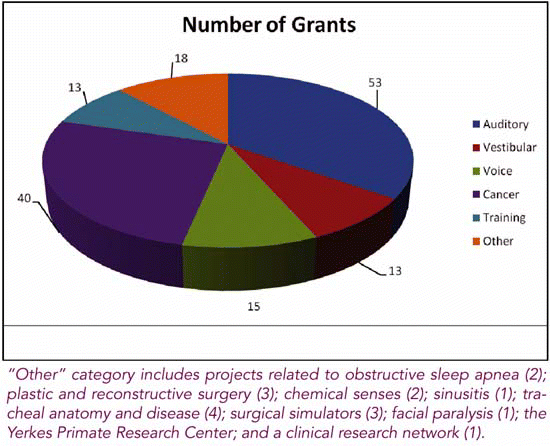
Explore This Issue
September 2007More than a quarter of all funded otolaryngologists-head and neck surgeons are the principal investigators of projects related to head and neck cancer (28.3%). The cancer portfolio offers an impressive cross-section of projects, ranging from the molecular biology and molecular genetics of cancer to novel imaging techniques for early detection, margin analysis, immunotherapy and other treatment approaches, identification of treatment response markers and development of prediction models for disease progression, and long-term outcome databases. The 43 projects are supported almost equally by the National Institute of Dental and Craniofacial Research (NIDCR; 53.5%) and the National Cancer Institute (NCI; 46.5%); many otolaryngologists, however, have found that the NIDCR, which identifies head and neck cancer as one of its specific research mission areas, is a more advantageous venue for such applications than the NCI, where they must compete for funding with applications for the high-priority programs of breast, lung, and prostate cancer. Very little activity is focused on plastic and reconstructive surgery, although the areas of wound healing, tissue engineering, and craniofacial reconstruction and allotransplant science are currently high-emphasis areas related to the ongoing Middle Eastern war efforts-offering low-hanging fruit to the motivated surgeon-scientist with interests and skills in these areas.
The Investigators
As of March, 2007, 116 otolaryngologists-head and neck surgeons were principal investigators of 151 NIH grants, contracts, or cooperative agreements (CRISP database, www.nih.gov ); 21 of the total number (18.1%) are female. Approximately 36% of the 116 investigators are members of the Triological Society; their projects account for 41% of the total, and 48% of the research project (R series) grants. Twenty-five investigators have multiple grants and 12 (48%) of these are Triological Society members. The undisputed leader in this category is Jennifer Rubin-Grandis, MD, of the University of Pittsburgh, principal investigator on an impressive six grants, including two institutional training grants (T32s), a Specialized Program of Research Excellence (SPORE) in head and neck cancer, and three R01s. Other prolific investigators include Margaretha Casselbrant, MD, PhD; Saumil Merchant, MD; Jay Piccirillo, MD; David Sidransky, MD; and Richard Smith, MD, with three grants each.
It is not surprising that the institutions with the most funded otolaryngology projects align closely with the NIH rankings of total funding for departments of otolaryngology: Johns Hopkins University (11); University of Pittsburgh (10); Massachusetts Eye and Ear Infirmary (9); and Washington University at St. Louis (8). What is surprising-and a bit of a cause for concern-is the observation that only 18% of the grants have been in existence for more than five years, the duration of a career development or the maximum project period of a research project grant. To be fair, 26% of the 89 R series grants are accounted for by R03 (small grants) and R21 (exploratory grants), which are limited by definition to two to three years of funding, but which are designed to be steppingstones to broader, more extensive support such as that available through the R01 (independent research project grant).
Leave a Reply